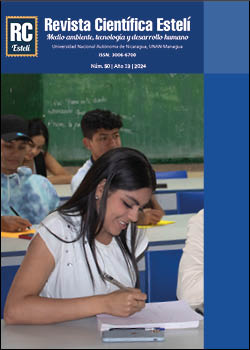Impact of SARS-CoV-2 genetic variants on hospitalization of patients with COVID-19 from the national surveillance of the Nicaraguan Ministry of Health, March 2020 - September 2022
DOI:
https://doi.org/10.5377/esteli.v13i50.18474Keywords:
SARS CoV-2, COVID-19, secuenciation, RT-PCRAbstract
SARS-CoV-2 spread rapidly around the world, causing high morbidity and mortality, making genome sequencing essential. Numerous studies have shown how variants can influence hospitalization. This study aimed to identify the impact of SARS-CoV-2 genetic variants on the probability of hospitalization. A total of 1069 samples from COVID-19 patients across the country were sequenced using Illumina and Oxford Nanopore technologies. Descriptive analyses and logistic regression models were performed to determine associations between virus characteristics and the risk of hospitalization. The main results showed that the most frequent variants were Omicron and Delta (21.32%) and 19B (21.2%). The less common variants were 21C (Epsilon) and 21H (Mu). Mutations were identified in the N, M, ORFs, and S regions of the SARS-CoV-2 genome, including the S:D614G mutation. Significant differences were found in the age of people infected with different variants. There was a negative association between increasing age and the risk of infection with the 19B variant, and a positive association with the 20B and Delta variants. Additionally, associations were found between the 20A, 20B, 20C, and Delta variants and the risk of hospitalization. Age was a determining factor in the risk of infection by certain variants. Some variants increased the risk of hospitalization, and age, in combination with the genetic characteristics of the variants, influenced this risk. The study concludes that mutations of epidemiological importance were identified, especially the S:D614G mutation, and that certain mutations and genetic characteristics of the virus can confer a higher risk of hospitalization.
Downloads
485
HTML (Español (España)) 92
Published
How to Cite
Issue
Section
License
Copyright (c) 2024 Revista Científica de la FAREM-Estelí

This work is licensed under a Creative Commons Attribution-NonCommercial-ShareAlike 4.0 International License.
© Revista Científica de FAREM-Estelí

